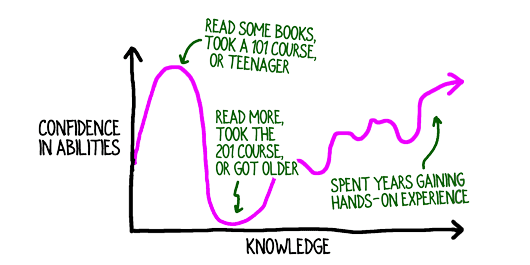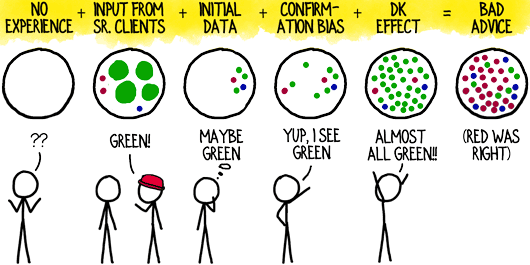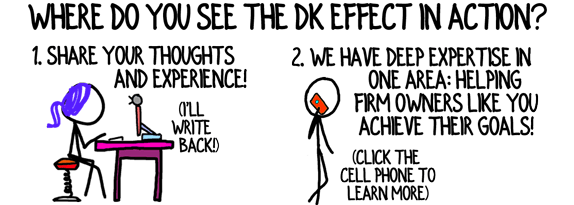Watching the Dunning-Krueger Effect in action can range from amusing to frustrating to downright frightening. The impact on your consulting firm is very real because it affects your target market and also your consulting team (including you).
What is the Dunning-Krueger Effect?

Your ten year-old, having watched you drive from their car seat, and with many hours of experience behind the wheel of their toy jeep, feels quite confident they can drive your new Tesla in traffic.
You look at any professional far removed from your expertise (legislator, traffic planner, tinker, tailor) and think, “Sheesh! I could do a way better job than them with my eyes closed.”
After devouring a documentary on bean-to-bar chocolate, you excitedly explain to your spouse how you will make millions if you invest all your retirement savings into a plot of land in Ecuador… oops, I may have been projecting.
According to Wikipedia, the Dunning-Krueger effect (a.k.a. “DK Effect”) is a cognitive bias in which people with limited competence in a particular domain overestimate their abilities.
The DK Effect at Your Client
DIY Mentality
Typically, you can’t win business from a client until they move past the DK Effect—the belief that they know enough or are competent enough to solve their problem themselves.
If the problem your consulting firm solves appears, at first glance, to be solvable using common sense, your prospects won’t appreciate or correctly value your help.
Remedy: Share information.
When you educate your prospects by generously offering your consulting firm’s ideas, approaches, and experience, your prospects’ awareness of their own incompetence will emerge.
The DK Effect at Your Consulting Firm
Generalism
Some consultants may enjoy being generalists because each time they work on a new problem or in a new industry, they quickly become an “expert” (in their own mind). Building a career out of overconfidence is a remarkable achievement; however, it’s not best for clients or the firm.
Remedy: Develop deep expertise in project design and management, which will be your consulting firm’s true strength if you’re committed to maintaining a generalist stance.
Remedy: Over-index on calling in subject matter experts to supplement your veneer of knowledge.
Leaping to Conclusions
Every consultant knows the temptation of drawing conclusions based on the first couple of interviews, the first client meeting or, worst of all, the surface similarity between the current project and a previous project.
Every excellent, experienced consultant knows how dangerously wrong those snap conclusions can be.
This tendency may peak when a consultant has about one year under their belt at their current position—analyst, engagement manager, donuts hustler or some other role. However, even tenured consultants can fall prey to the lure of an “obvious” early finding.
Remedy: Relentlessly frame early conclusions as hypotheses, then work as diligently to disprove the hypotheses as to prove them.
Weak Boards
Consulting firms that have decided to scale often pull together a board of advisors, typically comprised of a few individuals who successfully built (or worked in) a larger consulting firm. The appeal of obtaining guidance from someone who has “been there, done that” is clear.
However, those advisors frequently embody the DK Effect.
Having achieved one or two successes, they are overconfident in their knowledge of how to build a consulting firm. They often harbor an incorrect understanding of their own route to success, and mistakenly assume advice that worked in their own situation will translate well to the firm they’re advising.
Remedy: Absolutely seek advice from others on how to overcome the challenges your consulting firm is seeking; however, scrutinize the advice you receive, considering whether it is based on a single, personal experience (i.e., an anecdote), or broad knowledge of what has worked for many firms like yours.
Do you ever encounter laypeople who are overconfident in their knowledge of your consulting firm’s area of expertise? Have you ever been overconfident based on an introductory understanding of a topic?
Text and images are © 2024 David A. Fields, all rights reserved.

 David A. Fields Consulting Group
David A. Fields Consulting Group 



I’ve found that the DK Effect holds particular strength among small and mid-sized nonprofits (the organizations we serve).
In addition to the factors you list, most nonprofit leaders get told by funders and their boards that they must minimize non-program expenses at all costs. The (faulty) logic here: less money spent on overhead means more money for mission. Consequently, we see many DIY solutions, staff spread thin well beyond their actual areas of expertise, and organizations limping along with administrative departments held together with bubble gum and a prayer. (But at least they didn’t waste money on fads like the internet, right?)
So, the DK Effect becomes a big trap holding back the nonprofit sector and limiting its ability to create the change we want to see in the world.
Fabulous example, Sean. The combination of DK Effect and poor strategic thinking definitely plagues many non-profits, to their own detriment.
Thank you for sharing that excellent case study of the DL Effect “in the wild,” Sean. Great addition to the discussion.
Sean nailed it. “We fund programs not people.”
This edict is faulty because the Boards and Foundations don’t look at the moneys they spend on their support or shared services organizations.
They parrot what they have heard and assume they are now the experts at advising the nonprofits.
Thank David, as always, you frame consultant challenges in an “how to take action” approach.
Right you are, David. Intuitive, “logical” strategies are, at times, not best for an organization. With the DK Effect fully in force, inexperienced leaders fail to challenge their intuitive strategies. We do see this quite a lot in non-profits.
Thank you for adding to the discussion, David!
As a user experience and insights person…um, yeah.
I love the dots example…but I will note that actually realizing you ought to look at ANY dots is a leap for some 🙂
Well said! Some folks have impressive lack of self-awareness! Thank you for adding that extra bit of perspective, Troy.
i now know all there is to know about the D-K effect, thank you for confirming my full headedness…
but seriously, i’ve lost a ton of money investing in marketing firms that were 100% confident they knew how to market executive coaching services because they had helped coaches (i.e. business coaches, life coaches) and all marketing is the same …
Great article and confirmation of my exasperation …
Even writing about the D-K Effect includes a bit of irony! Sorry to hear that you’ve been (unintentionally) bilked by marketing folks overconfident in their abilities. Your experience is not unusual, Steven.
A lot of folks outside of consulting and coaching think they understand the business because, after all, how difficult or different can it be from any other profession? The harsh reality can be attested to by the droves of corporate executives who totally fail in a consulting or coaching role.
I do appreciate your sharing your own tale of woe, Steven. Others who’ve experienced what you went through won’t feel like it was their fault.
Having built a software company based on Microsoft Excel, I have found that DIY Excel experts think they can build anything our software can do in their spare time. Of course, they often get the formulas wrong or their XL worksheet is unmaintainable or too limited in functionality. And based on their years of experience they are more than happy to tell me I’m wrong without checking if there’s been advancements over their lifetime.
I don’t even pretend to know everything. It’s just not possible. So, I reconfirm everything. I’m rarely wrong. And when I am, I admit it.
In consulting, I have often found that there’s more than one right answer to any situation. Getting all of the answers out on the table helps create understanding and clarity for action.
Good example, Jay. And as you rightly point out, there are typically multiple good answers that will help a client make progress. Any time we are locked into a single solution–especially one we jump to quickly before having a full scope of data, we’re setting ourselves up for trouble.
Thank you for adding your personal experience of the D-K Effect to the conversation, Jay.